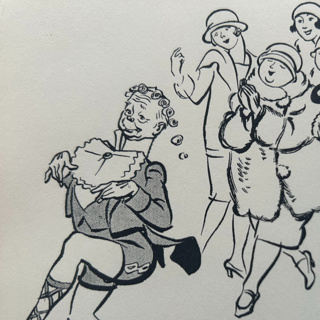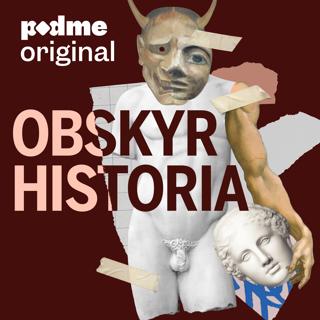
164. Liberal stirrings against Tory dominance
We’ve been tracking years and years of Tory rule in Britain. It’s as though the once dominant Liberal Party had practically vanished from the scene. In fact, though, things were changing in its ranks, with new figures emerging to lead the party back towards government. One of these, David Lloyd George, we’ve met before but briefly and, in this episode, we get to know him better. However, despite the moves to start sorting out the Liberals’ difficulties and, above all, the internal divisions that were losing it so much support, it still had more pain to come. The outbreak of the Boer War only revealed more dissension among its leaders and, since split parties don’t win elections, that together with the government’s apparent victory in South Africa as well as against the Boxer Rebellion in China, would cost the Liberals another landslide defeat in 1900. Another landslide though not quite as big as might have been expected, given how much circumstances favoured the Conservatives and handicapped the Liberals. Was that a glimmer of hope for the future? As well as Lloyd George, who won re-election in 1900 despite his anti-war stance, two other historic figures entered parliament at that election. Keir Hardie of the Independent Labour Party, who’d lost his seat in 1895, returned in 1900. And Winston Churchill won a seat for the first time, at the start of nearly 64 years in parliament with only a brief interruption. Illustration: David Lloyd George, by Harry Furniss: fiery Welsh radical giving his opponents a bad time. National Portrait Gallery 3398 Music: Bach Partita #2c by J Bu licensed under an Attribution-NonCommercial-No Derivatives (aka Music Sharing) 3.0 International License.
15 Okt 202314min

163. Boer War: the struggle to turn the tide
The tide turned for the British in South Africa when they sent enough troops out to overwhelm the Boers entirely – well over half a million over the whole length of the war or approaching half as many again as the entire Afrikaner population. They also replaced some hopeless generals by a couple of more effective ones, Frederick Roberts, who’d served with distinction in the Second Afghan War, with Herbert Kitchener, fresh from his triumphs in Sudan, as his chief of staff. Better generals and huge numerical superiority turned the war in Britain’s favour. In the course of 1900, the three cities the Boers had besieged were relieved, and British troops drove the enemy back onto their own territory, and then occupied the capitals of both Boer republics. The war seemed to be over and the British government at home was so sure of its victory that it called the first ‘khaki’ election, chalking up a major political win to go with its military success in South Africa. However, victory against the Boers was by no means as secure as the Salisbury government thought. Indeed, the war was on the brink of its third phase. That we’ll be looking at soon and it was anything but a credit to the British Empire. Illustration: Robert Baden Powell, defender of Mafeking and founder of the boy scouts, in 1908. Bromide print by H. Walter Barnett National Portrait Gallery x45253 Music: Bach Partita #2c by J Bu licensed under an Attribution-NonCommercial-No Derivatives (aka Music Sharing) 3.0 International License.
8 Okt 202314min

162. Britain against the Boers, or how not to fight a war
Two depressingly similar men, unbending, old, bearded, entirely committed to the advantage of their own race, were glaring at each other between the Boer Republic of the Transavaal and the imperial heartland of Great Britain. President Kruger of the Transvaal was determined to protect the way of life of his Boer people, at the expense of denying the other whites moving into his country any of the rights associated with democracy, while regarding its black inhabitants as entitled to still less consideration. Lord Salisbury, Prime Minister of Great Britain, was determined to show that it was Britain that was boss in South Africa. He was also keen on avenging Britain’s humiliation in the First Boer War, when its army was beaten at the Battle of Majuba Hill. When the two countries came to blows, however, things seemed to be going strongly the Boer Way. After a few months of fighting, at the end of 1899, complacency by the British authorities and some astonishingly bad generalship on the ground, had combined to make it look as though the Second Boer War might go the same way as the first, with another British defeat. Illustration: Stephanus Johannes Paulus ('Paul') Kruger, President of the Transavaal, by Duffus Bros, 1890s National Portrait Gallery x19163 Music: Bach Partita #2c by J Bu licensed under an Attribution-NonCommercial-No Derivatives (aka Music Sharing) 3.0 International License.
1 Okt 202314min

161. Exciting adventure, crushing misery: two sides of Empire
An episode in two parts. The first is an adventure story, the extraordinary march across Africa of a small detachment of French troops led by Major Jean-Baptiste Marchand. He occupied the abandoned Egyptian fort on the Nile at Fashoda. There he was met not by the planned supporting columns of Frenchmen, but by General Kitchener with a massively bigger force. In fact, the two men didn’t fight, but met and were perfectly courteous with each other. It was up to the politicians in London and Paris to sort out the Fashoda incident. Given how precarious the French position was, inevitably it was resolved in favour of the intransigent British Prime Minister, who emerged with a British monopoly on access to the Nile in Sudan. Poor Marchand had to march away again having achieved very little, except to establish himself as a model for little boys to admire. The second part is about the other side of the coin of imperial Britain. That was the unbearable, crushing poverty in which a huge proportion of the population lived. Charles Booth, arguably the first Social scientist, established in his remarkable research that 30% of the population of London were living below the poverty line, and that line was a lot lower than it is today. Grandeur was the outward-looking face of Empire; behind the scenes, things were a lot uglier. Fashoda was just one critical incident for Britain in Africa. The next would be in South Africa. And the Empire would be looking for the men to fill the ranks of its army among just those poor, crushed by their misery and undermined by disease. Illustration: Jean-Baptiste Marchand on the cover of French magazine celebrating his march across Africa. © Paris - Musée de l'Armée, Dist. RMN - Grand Palais / Pascal Segrette 06-506187 / 2001.72.2 Music: Bach Partita #2c by J Bu licensed under an Attribution-NonCommercial-No Derivatives (aka Music Sharing) 3.0 International License.
24 Sep 202314min

160. Managing power, coping with weakness
Salisbury had a fairly accurate view of just what Britain could and couldn’t do on its own, given the limitations on British power itself, but also the blocks caused by domestic political opposition . He equally had a clear notion of just what massive damage the new generations of weapons might do in a war in which both sides had them, essentially a war between great powers. Finally, he also understood that the point of empire wasn’t sentiment, it was business. All this made him deeply suspicious of the Jingoist spirit of many who wanted to push Britain’s imperial interests ever further forward. Instead, however much the Jingoes might criticise him for it, he preferred to concede to rivals in areas where he felt no vital interest was at stake. On the other hand, where such an interest was on the table, he was more than prepared to fight. He’d decided, in particular, that given his colleagues’ fear of taking on Turkey, the best way to protect the Suez Canal, the vital link to India, was through Britain’s control of Egypt. But Egypt depended on the Nile, and that river ran through Sudan. That’s why, while Salisbury avoided war over West Africa, or over holdings grabbed by other powers in China, or with the US over the Guyana-Venezuela border dispute, he stood firm over Sudan and sent Kitchener in there to win his victory of Omdurman and then against the remaining Mahdist forces as he swept southwards. Control of the Nile Valley was a goal he felt Britain could achieve and which would be key to its imperial interests. So it was worth fighting for. Even, as we’ll discover next week, when that brought him into conflict with a great power. Illustration: The main gate to the munitions depot in Quingdao, after the German occupation, in 1898. From the Bundesarchiv of the Federal Republic of Germany. Music: Bach Partita #2c by J Bu licensed under an Attribution-NonCommercial-No Derivatives (aka Music Sharing) 3.0 International License.
17 Sep 202314min

159. Ireland and another Balfour; Sudan and Churchill again
The running sore of British relations with Ireland was running still and just as sore. This time another Balfour, Gerald as opposed to his brother Arthur, but like him a nephew of the Prime Minister Salisbury who nepotistically appointed him, was pursuing a policy designed to address some Irish grievances, rather than simply tighten repression. That was made easier by the reduction in unrest and even of Home Rule fervour in Ireland, together with the loss of the iconic leader Parnell. Balfour felt it was legitimate to reward a quieter Ireland with concessions, while at the same time, it also helped reconcile the Irish to British power and even to undermine still further the demand for Home Rule. That, in turn, weakened the Liberals’ and Irish Nationalists’ position, since they were firmly committed to seeing an Irish Parliament recreated. Balfour would always claim, however, that these political advantages, while welcome, were never his main aim. Abroad, Britain sent a joint Anglo-Egyptian force out from Egypt to reconquer Sudan. That would complete the uninterrupted sting of British holdings or controlled territories across the whole continent of Africa, from South to North. It would also provide the opportunity, at the Battle of Omdurman, for a young lieutenant, Winston Churchill, to take part in the last significant cavalry charge in British history. Illustration: The Charge of the 21st Lancers by Edward Matthew Hale, a key moment in the Battle of Omdurman, and in the military history of then Lieutenant Winston Churchill. Public Domain. Music: Bach Partita #2c by J Bu licensed under an Attribution-NonCommercial-No Derivatives (aka Music Sharing) 3.0 International License.
10 Sep 202314min

158. Sending Wilde to the Wilderness
Henry Labouchère’s amendment of 1885 had criminalised any sexual act between men, labelling it gross indecency, an offence which was a great deal easier to prove than the older charge of sodomy. In 1895, Oscar Wilde was at the peak of his fame and acclaim, with his play The Importance of Being Earnest having had a hugely successful premier. He was also in a stormy relationship with Alfred Douglas, the son of the Marquess of Queensberry (yes, he of the rules of boxing). Queensberry had already lost his eldest son, killed it was maintained in public in a shooting accident, believed in fact to have committed suicide, following an affair with no less a man than the Prime Minister, Lord Rosebery. When Queensberry realised that another son was involved in something similar, he hit the roof. He left a card at Wilde’s club with the accusation that he was a ‘sodomite’. Wilde felt the accusation was so serious, he had to sue for libel. Sadly, his case fell apart, especially under the acute cross examination of a lawyer destined for a brilliant career in the law and in politics, Edward Carson. He defended Queensberry by setting out to show that the allegation against Wilde was true. Sadly, by doing that he provided all the evidence Wilde’s enemies needed to have him condemned in a criminal trial himself. And with that, Wilde was bankrupted and his career destroyed. “I have ruined the most brilliant man in London,” Carson is reported to have said. Certainly, he contributed. But the real blame was a law that made the unorthodox behaviour of the most brilliant man in London not just a difference to tolerate, but a deviance to persecute. Illustration: Oscar Wilde and Alfred Douglas, in a gelatin silver photo of 1893, by Gillman & Co, National Portrait Gallery P1122 Music: Bach Partita #2c by J Bu licensed under an Attribution-NonCommercial-No Derivatives (aka Music Sharing) 3.0 International License.
3 Sep 202314min

157. Triumph and Decline
Lord Salisbury had decided to serve as his own Foreign Secretary and, indeed, it was events abroad that most marked his third administration. This episode starts by looking at the great feast of Empire which was Queen Victoria’s diamond jubilee of 1897. It was Britain at its peak of might, with the biggest empire the world had ever seen, wealthy, powerful, and with a people broadly united behind the Queen, her Empire and her government. That last bit was something that men like Salisbury, in the government, made the most of. But behind the scenes, a rather different picture was beginning to emerge, of a country whose power, while great, was already in decline. This episode looks at three widely different events, out of the many that Salisbury addressed, that suggest this was happening: the Jameson raid in South Africa, the failure to intervene in support of the Armenian Christians against ongoing massacres by their Turkish overlords, and the US support for Venezuela in a border dispute with then-British Guiana. Illustration: Dr Jameson (fourth from left) and the officers of the Jameson Raid, 1896. National Portrait Gallery P1700(20b) Music: Bach Partita #2c by J Bu licensed under an Attribution-NonCommercial-No Derivatives (aka Music Sharing) 3.0 International License.
27 Aug 202314min





















